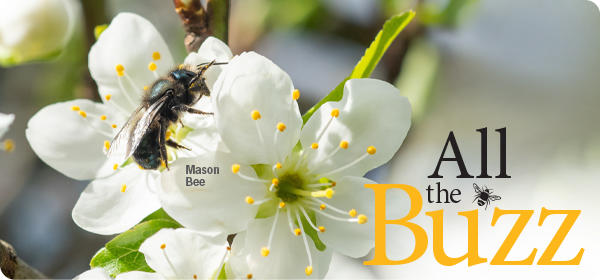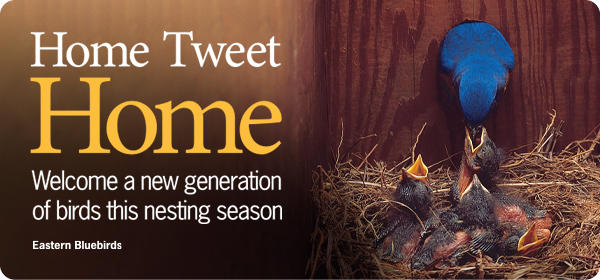Welcome, Vancouver!
Mason Bees are in-stock

Bring these incredibly efficient pollinators to your yard.
Wildlife habitat gardens can support twice as much wildlife as conventional lawns or ornamental non-native plant gardens. Many pollinator populations are in decline, due to the loss of natural habitats and native plantings along with the impact of pesticide use. You can help pollinators survive and flourish by creating a pollinator-friendly environment in your yard.
Mason bees are all the buzz as an incredibly effective, native pollinator and are among the easiest bees to raise in your yard, while also being the safest due to their gentle nature.
- Unlike honey bees, mason bees carry pollen on their bellies rather than on their hind legs, which helps to make them highly efficient pollinators. A single mason bee will visit between 1,600 to 2,400 blossoms daily, and pollinate over 90% of them. A female visits an average of 75 flowers per foraging trip.
- Mason bees lay their eggs in tunnel nests that are constructed in abandoned holes created by wood-boring insects, hollow plant stems or artificial houses and tubes. Although mason bees are solitary, they are often gregarious and will nest near other mason bees. When building their nests, female mason bees use clay to build partitions and to seal the tunnel entrance. This unique mud-building behavior is what led to the name “mason” bee.
- Mason bees are not aggressive towards people. You can watch them work without fear of being stung. Mason bees are metallic blue, black or green in color and about the same size as a house fly. There are 140 species of mason bees in North America.
Visit us to learn how to successfully set up a mason bee house and have a bee-utiful pollination season!

Nesting: Bringing Bird Families Home
What a great time of year! Longer days and warmer temperatures help to rapidly reawaken the natural world around us during this true season of renewal. Our fields and forests celebrate with splashes of amazing colors…from freshly blooming wildflowers to the return of migrant songbirds decked out in their finest breeding plumage.
Yes, nesting season is just around the corner. A new generation of birds will soon be entering the world.
Many of them will call your yard home. You might even say that their families will become part of your family. And you can make a significant difference in how well these extended families will thrive and survive in your own backyard.
Consider providing a little “pre-natal” boost for your birds. The need for protein and calcium increases substantially for birds as they prepare for nesting and during periods of egg-laying. Obtaining a sufficient amount of these nutrients determines the number of eggs a bird is able to produce and impacts the health of young birds. Wild Birds Unlimited’s Nesting SuperBlend™ is a great bird food to help you provide the essential protein and calcium needed by nesting families.
For birds that use nesting boxes (think chickadees, wrens, northern flickers, etc.), it is important that they are made from high quality materials that will help insulate the youngsters from extreme cold or heat. Proper drainage and ventilation are a must and the box has to be easy to clean in preparation for the next tenant. Nesting boxes should also be specifically designed for the type of bird that is likely to make your yard its home and they should be placed in a location that is safe and enticing.
WBU has a complete line a high quality nest boxes to help get you started.
For a fun and entertaining look into the world of our nesting neighbors, be sure to check out the WBU Nature Centered Podcast episode, “Nesting: A Bird’s Eye View.” Hosts John and Brian will share the expert advice that will help you to attract, foster and enjoy more bird families around your own home.




Get excited for the Greater Vancouver Bird Celebration! Celebrate all things bird from May 10th to 26th
learn more
